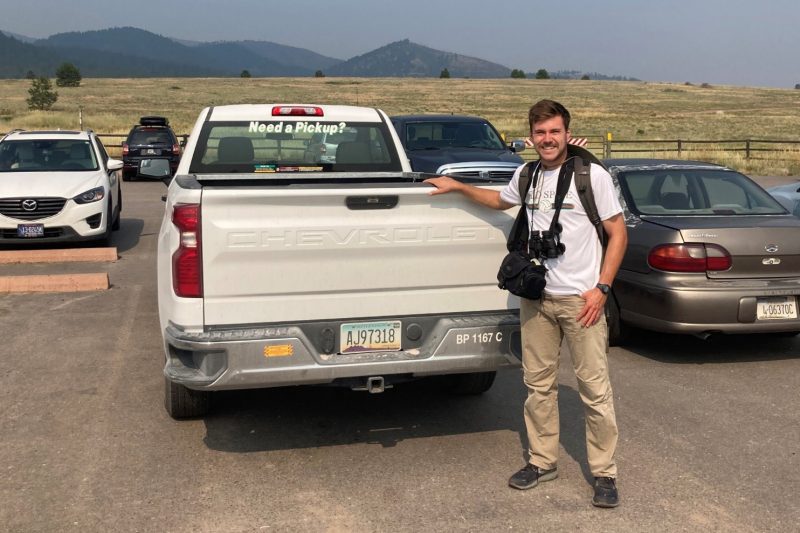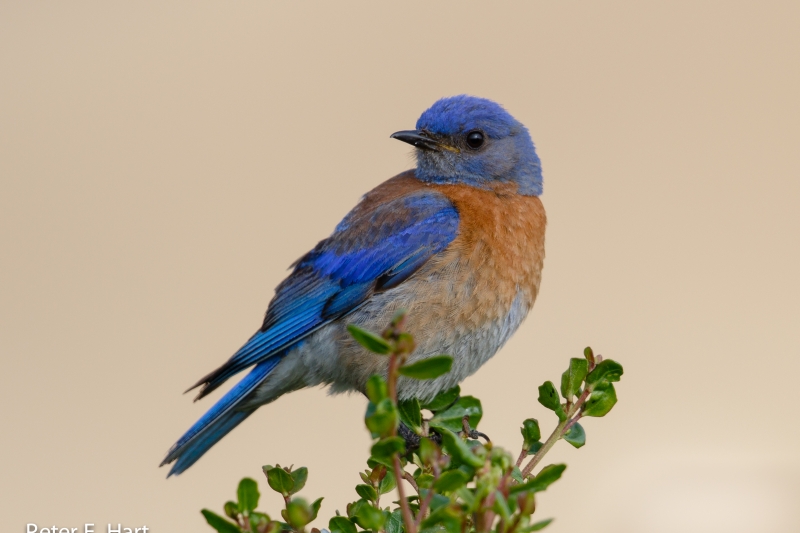The Bluebird of Happiness Chris Tucker '23 spent the summer researching Western Bluebirds in Missoula with a biology professor from the University of Arizona.
“I enjoyed seeing many of the concepts from the classes that have fascinated me the most at W&L, like Zoology and Herpetology, come to life. I also think the difficulty of some of the classes I’ve taken prepared me for the workload of this job.”
Hometown: Katy, Texas
Major: Biology
Q: You’re doing what sounds like a fascinating internship in ornithology research at the University of Arizona. Did you consider yourself a bird lover before this?
Oh yeah! It began when I was in elementary school with a field guide to Texas birds that I bought at a thrift store. I found myself reading it a lot at school, and the names of the birds began to stick as I put my knowledge to practical use whenever the opportunity arose – on vacation, while hiking, sitting in the backyard, or whenever I felt the curiosity to find new birds.
Q: How did you get connected with this opportunity?
Over winter break, I reached out to a number of accomplished researchers in the field of ornithology, guided by a list of acclaimed graduate programs published by the Wilson Ornithological Society. Opportunities were scarcer this summer than most, largely due to the pandemic, but a few professors responded positively to my inquiries. I applied to some programs, and after an interview with Professor Renee Duckworth from the University of Arizona, I was on the job! I also have a lot of thanks to offer Molly Steele ’04 in W&L’s Office of Career and Professional Development and Jessica Rosarda ’10, who both helped me a lot in this process.
Q: What all does this job entail, and what might a typical day look like?
Professor Duckworth’s focus is on Western and mountain bluebirds, although my undergraduate co-worker, a rising senior at Cal Poly, and I mostly handled Western bluebirds in the field this summer. During the busy season (end of May through middle of June), we were out every morning around 6 a.m., six days a week, so that we could beat the heat. The amount of time we worked each day was sculpted around that day’s responsibilities, meaning how many there were, how we planned them and how efficiently we moved through them.
These included tasks like taking blood samples from nestlings, banding birds, finding new nests and collecting data for our independent projects, funded by the National Science Foundation Research Experiences for Undergraduates (REU) Program. We also checked the progress of each nest, which could require daily visits if nest activity required it, like if the female had begun laying eggs or if the nestlings were at the brink of fledging. With communication, a good plan and maybe a little trail-running, we would get through the day’s work in 6-8 hours and, after some “homework,” I often had time to explore the other fun outdoor pastimes that Missoula had to offer. Floating the Clark Fork River was a relaxing, leisure-time activity that my friend and local guide, Stew Long ’23, and I often enjoyed.
Q: What has been your favorite moment on the job so far this summer? And the most challenging part of the job?
I really enjoyed the opportunity to be so close to nature. The job involved lots of work directly with the baby birds, which meant handling them outside of the nest at various stages in their development. Doing this, I got the chance to see each baby bird grow from a tiny, pink rubber ball with eyes sealed shut to a colorfully feathered juvenile, ready to leap from the nest.
Spending that much time outdoors offered more opportunities than those involving the bluebirds! On the way to my next task, I would come across white-breasted nuthatches, brave enough to bark at me as I passed the tree that they called home, or perhaps I’d stumble upon a chipmunk or an American red squirrel that had decided to build its nest in one of our bird boxes, not expecting my company. At one box, I peeked inside to find a Northern flying squirrel!
The most challenging part was the new independence of it all. At the beginning of the summer, my co-worker and I received training and then were “let loose.” However, we were largely responsible for planning the data collection, and the accuracy of our measurements and observations were dependent upon our own problem-solving ability, especially if a task went unexpectedly. I guess it’s what you could call “trial by fire.” But a healthy fire.
Expenses also presented a challenge, as they turned out to be a little more than I had anticipated. I was allocated grants from both W&L and from University of Arizona to cover the costs of living and transportation. However, this summer saw a dramatic rise in domestic travel, and Missoula is a popular destination for tourists seeking to travel to Glacier National Park. I first experienced Missoula’s scarcity for housing and car rentals when I began my search near the end of March. Housing opportunities on Craigslist and Facebook were being snatched up within hours of posting. Fortunately, I was able to find a two-bedroom apartment in downtown, as well as a U-Haul pick-up truck, which made me feel like quite the mountain man.
Q: How do you expect these experiences to impact your W&L education and your future career?
This opportunity afforded me experience with many of the tools and methods that are commonly used in the field of ornithology. Being able to develop an independent research project exposed me to the challenges and responsibilities that accompany that freedom. Professor Duckworth also shared some of her papers at the culmination of the job so that my co-worker and I could better understand how our summer’s work might be applied. These also provided insight into what a career down this path would look like and how I might shape the research I’d find myself doing.
Q: What have you learned at W&L that helped you in these endeavors?
I enjoyed seeing many of the concepts from the classes that have fascinated me the most at W&L, like Zoology and Herpetology, come to life. I also think the difficulty of some of the classes I’ve taken prepared me for the workload of this job. I was able to easily find the the time to enjoy my stay in this amazing city, and I am very grateful for that.
If you know any W&L students who would be great profile subjects, tell us about them! Nominate them for a web profile.
 Chris Tucker ’23 with his trusty U-Haul pickup.
Chris Tucker ’23 with his trusty U-Haul pickup. Western bluebird. Wikimedia Commons
Western bluebird. Wikimedia Commons
You must be logged in to post a comment.